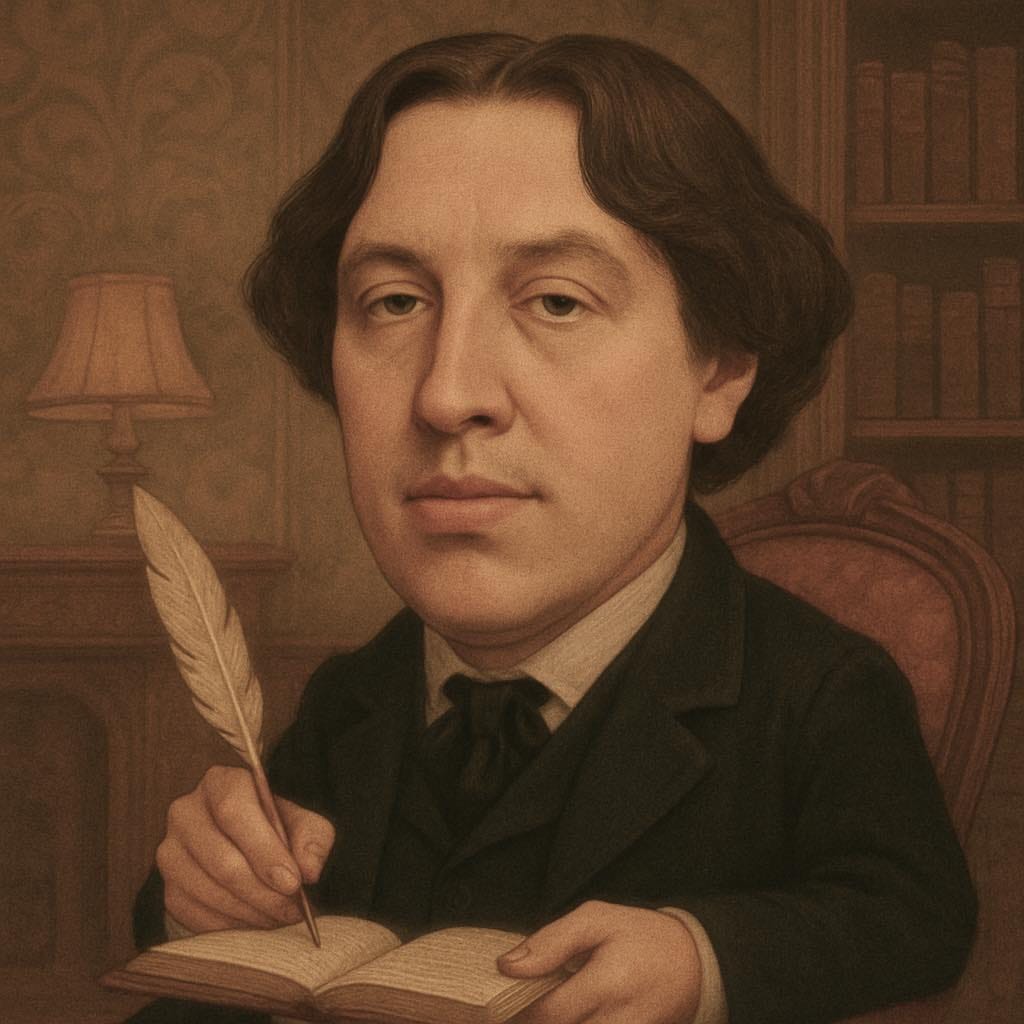Oscar Wilde remains one of literature’s sharpest wits, a master of paradox who wielded language with precision and irreverence. His aphorisms on love, life, and society retain their brilliance by blending humor, cynicism, and unexpected tenderness. Wilde’s style, marked by epigrammatic conciseness, irony, and a flair for the theatrical, makes his observations as provocative today as they were in the Victorian era.
Below, we explore 15 of his most enduring quotes, grouped thematically, with analysis of their literary techniques, subversive edge, and cultural impact.
The Paradox of Love: Idealization and Disillusionment
- “To love oneself is the beginning of a lifelong romance.”
- “Women are meant to be loved, not to be understood.”
- “Men always want to be a woman’s first love. That is their clumsy vanity. We women have a more subtle instinct about things. What we like is to be a man’s last romance.”
Wilde’s observations on love oscillate between romantic idealism and biting realism. His aphorisms often expose the contradictions inherent in human desire—self-love as both vanity and necessity, the tension between passion and pragmatism.
The first quote, from Wilde’s four-act play, An Ideal Husband (1895), subverts traditional morality by framing narcissism as a virtue, a stance that scandalized Victorian sensibilities. The second, from his short story “The Sphinx Without a Secret” (1887), distills his view of romantic relationships into a single, devastating line, slyly critiquing Victorian masculinity’s insistence on dissecting feminine nature.
The third quote, from A Woman of No Importance (1893), dissects gendered expectations with surgical precision. Wilde’s epigrammatic style here—balanced, rhythmic, and paradoxical—mirrors the societal double standards he critiques. The line endures in pop culture, often quoted in discussions of modern relationships, which proves its lasting relevance.
Life as Art: Aestheticism and Hedonism
- “It is none the less true that Life imitates art far more than Art imitates life.”
- “We are all in the gutter, but some of us are looking at the stars.”
- “Live! Live the wonderful life that is in you! Let nothing be lost upon you. Be always searching for new sensations. Be afraid of nothing.”
Wilde, the high priest of aestheticism, championed beauty and sensation over moral didacticism. The fourth quote, taken from “The Decay of Lying” from his book of essays, Intentions (1891), inverts Plato’s mimesis, arguing that reality molds itself after artistic representation rather than the reverse. This idea influenced later movements like postmodernism, where the boundary between art and life blurs.
The fifth quote, from his comedy play Lady Windermere’s Fan (1893), juxtaposes degradation and aspiration in a single sentence. The contrast between “gutter” and “stars” encapsulates Wilde’s dual vision, acknowledging human frailty while celebrating transcendence. Its poetic brevity has made it a favorite in films, music, and motivational speeches.
The sixth, from The Picture of Dorian Gray (1890), advocates hedonism with an almost religious fervor. The imperative verbs (“Live!” and “Be afraid of nothing”) echo Nietzschean individualism, rejecting Victorian restraint. Wilde’s prose here is incantatory, a stylistic choice that heightens its seductive power.
Society and Hypocrisy: Satire and Subversion
- “Morality is simply the attitude we adopt towards people whom we personally dislike.”
- “The truth is rarely pure and never simple.”
- “A man who moralizes is usually a hypocrite, and a woman who moralizes is invariably plain.”
Wilde’s contempt for hypocrisy fuels his most sardonic lines. The seventh quote here, again from An Ideal Husband, reduces morality to personal bias, a radical stance in an era obsessed with propriety. Its bluntness exemplifies Wilde’s preference for uncomfortable truths over polite fiction.
The eighth quote, from The Importance of Being Earnest (1895), plays with parallelism (“rarely pure and never simple”) to mock society’s pretenses. The phrase’s rhythmic symmetry makes it memorable, while its sentiment (that truth is messy) resonates in an age of media spin and political doublespeak.
The ninth, again from Lady Windermere’s Fan, dripping with misogynistic wit, reflects Wilde’s complicated relationship with gender. While progressive in many ways, his work occasionally indulges in stereotypes. Yet the humor here lies in its audacity, a hallmark of Wilde’s style, delivering a shocking statement with such polish that it disarms criticism.
Suffering and Wisdom: The Price of Experience
- “Experience was of no ethical value. It was merely the name men gave to their mistakes.”
- “Where there is sorrow, there is holy ground.”
- “We teach people how to remember, we never teach them how to grow.”
Wilde’s later works, transformed by his imprisonment and downfall, reflect a darker, more introspective tone. Again, from The Picture of Dorian Gray, the tenth quote reframes failure as inevitable education, a sentiment that aligns with modernist disillusionment. Its simplicity belies its profundity, a trademark of Wilde’s mature style.
The eleventh quote, from De Profundis (1905), Wilde’s letter to his friend and lover, Lord Alfred Douglas, elevates suffering to the sacred. Written during his incarceration, the line’s solemnity contrasts with his earlier flippancy, revealing a man humbled by tragedy. The biblical cadence (“holy ground”) lends it gravitas, showing Wilde’s ability to shift registers when needed.
The twelfth quote is taken from the dialogue “The Critic as Artist,” also from Intentions, which critiques institutionalized learning, a theme later expanded by thinkers like John Dewey. Wilde’s disdain for rote memorization reflects his belief in individualism, a philosophy that still informs debates on education reform.
Wit as Weapon: The Power of Language
- “I can resist everything except temptation.”
- “The only way to get rid of a temptation is to yield to it.”
- “It is a very sad thing that nowadays there is so little useless information.”
Wilde’s humor relies on inversion: taking a cliché and subverting it with a twist. The thirteenth and fourteenth quotes, from Lady Windermere’s Fan and The Picture of Dorian Gray, respectively, exemplify this. By flipping expectations (“resist everything except temptation”), he exposes human irrationality while delighting the reader with linguistic play. The grammatical symmetry of these lines (parallel structure, balanced clauses) makes their heresies palatable, even delightful.
The fifteenth and last quote—from A Few Maxims for the Instruction of the Over-Educated (1894), his short collection of maxims and aphorisms—Wilde epitomizes his assault on utilitarian thinking. By lamenting the scarcity of “useless information,” he champions art for art’s sake while mocking the era’s obsession with practicality. The deliberate absurdity of the statement (a mock lament delivered with perfect sincerity) reveals his method: truth wrapped in apparent frivolity.
Wilde’s Enduring Legacy
Wilde’s quotes endure because they balance elegance with rebellion, wrapping uncomfortable truths in exquisite phrasing. His literary techniques (paradox, antithesis, rhythmic precision) make his lines unforgettable, while his themes (love’s contradictions, society’s hypocrisy, art’s supremacy) remain strikingly modern.
Whether in The Picture of Dorian Gray’s decadence or The Importance of Being Earnest’s farce, Wilde’s voice—witty, wounded, and unapologetically clever—continues to challenge and charm. His influence echoes in modern satire and permeates pop culture. From RuPaul’s Drag Race to the deadpan irony of Fran Lebowitz to the curated irreverence of Private Eye, Wilde’s genius lies in making the profound seem effortless and the subversive irresistible.
Further Reading
Life of Oscar Wilde by The British Library
Oscar Wilde’s Art of Disobedience by Rachel Vorona Cote, The Nation
Oscar Wilde on Art and Cultivating the Crucial Temperament of Receptivity by Maria Popova, The Marginalian
Oscar Wilde’s most enduring epigrams – infographic by Zhenia Vasiliev and Adam Frost, The Guardian




